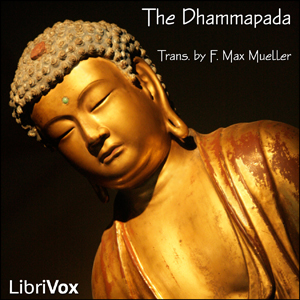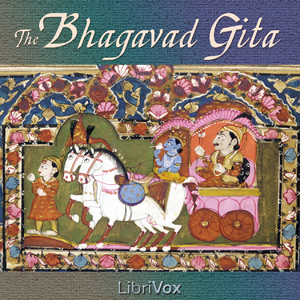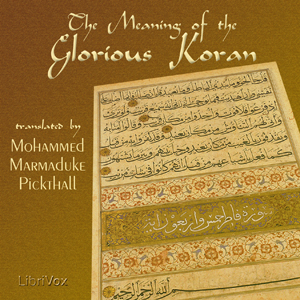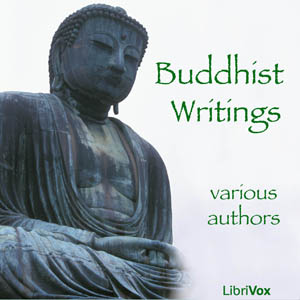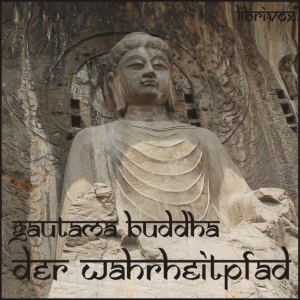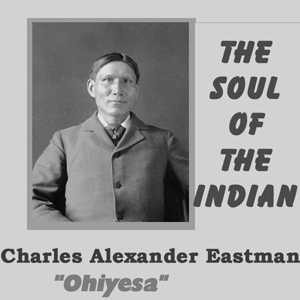The Dhammapada is is a Buddhist scripture, containing 423 verses in 26 categories. According to tradition, these are verses spoken by the Buddha on various occasions, most of which deal with ethics. It is is considered one of the most important pieces of Theravada literature. Despite this, the Dhammapada is read by many Mahayana Buddhists and remains a very popular text across all schools of Buddhism. - Excerpted from Wikipedia
7 episodes
The content of the text is a conversation between Krishna and Arjuna taking place on the battlefield of Kurukshetra just prior to the start of a climactic war. Responding to Arjuna's confusion and moral dilemma, Krishna explains to Arjuna his duties as a warrior and Prince and elaborates on a number of different Yogic and Vedantic philosophies, with examples and analogies. This has led to the Gita often being described as a concise guide to Hindu philosophy and also as a practical, self-contained guide to life. During the discourse, Krishna reveals his identity as the Supreme Being Himself (Bhagavan), blessing Arjuna with an awe-inspiring glimpse of His divine absolute form. - Wikipedia
19 episodes
The Koran (Qur'an) is regarded by Muslims as the word of God (Allah) as revealed to the prophet Muhammad. It is divided into 114 chapters (surahs), arranged roughly by length. This version, The Meaning of the Glorious Koran, is a widely used English translation of the Koran by a Muslim Englishman. Many Muslims, however, including Pickthall, believe that true translations of the Koran from the original Arabic are impossible, and see translations into other languages only as useful interpretations. (Summary by Leon Mire)
69 episodes
An anthology of Buddhist scriptures, appropriate as an introduction to its vast literature, or as a sampler for those who want to better understand Buddhism. The selections in this anthology are primarily from the Theravada school of Buddhism. (Summary by Leon Mire)
31 episodes

Apollonius of Tyana (ca. 40-120 AD) was a Greek Pythagorean philosopher and teacher. He hailed from the town of Tyana in the Roman province of Cappadocia in Asia Minor. His date of birth is a matter of conjecture as some say he was roughly a contemporary of Jesus.
After Apollonius' death his name remained famous among philosophers and occultists. In a "novelistic invention" inserted in the Historia Augusta, Aurelian, at the siege of Tyana in 272, was said to have experienced a visionary dream in which Aurelian claimed to have seen Apollonius speak to him, beseeching him to spare the city of his birth. In part, Aurelian said that Apollonius told him "Aurelian, if you desire to rule, abstain from the blood of the innocent! Aurelian, if you will conquer, be merciful!"
By far the most detailed source is the Life of Apollonius of Tyana, a lengthy, novelistic biography written by the sophist Philostratus at the request of empress Julia Domna. Philostratus’ account shaped the image of Apollonius for posterity and still dominates discussions about him in our times. To some extent it is a valuable source because it contains data from older writings which were available to Philostratus but disappeared later on. Many think that it is full of obviously fictitious stories and dialogues. Modern Christian scholars challenge its credibility in many regards. They dismiss most of it as pure invention.
One of the essential sources Philostratus claimed to know are the memoirs or diary of Damis, an alleged disciple and companion of Apollonius. Some scholars believe the notebooks of Damis are an invention of Philostratus. In any case it is a literary fake. Philostratus describes Apollonius as a wandering teacher of philosophy and miracle worker who was active in Italy, Spain and Ethiopia and even travelled to Mesopotamia, Arabia and India. In particular, he tells lengthy stories of Apollonius entering the city of Rome in disregard of emperor Nero’s ban on philosophers, and later on being summoned, as a defendant to the court of emperor Domitian where he defied the emperor in blunt terms.
Apollonius may have never left the Greek East. Many contend that he never came to Western Europe and was virtually unknown there till the third century AD when empress Julia Domna, who was herself an Easterner, decided to popularize him and his teachings in Rome. For that purpose she commissioned Philostratus to write the biography, where Apollonius is exalted as a fearless sage with supernatural powers, even greater than Pythagoras. Philostratus implies that upon his death, Apollonius of Tyana underwent heavenly assumption. Subsequently Apollonius was worshipped by Julia’s son emperor Caracalla and possibly also by her grand-nephew emperor Severus Alexander.
Two biographical sources earlier than Philostratus are lost: a book by emperor Hadrian’s secretary Maximus of Aegae describing Apollonius’ activities in the city of Aegae in Cilicia, and a biography by a certain Moiragenes. (Summary adapted from Wikipedia by Karen Merline)
43 episodes

Pantheisticon: or, the Form Of Celebrating the Socratic-Society. Divided into Three Parts. Which Contain, I. The Morals and Axioms of the Pantheists; or the Brotherhood. II. Their Deity and Philosophy. III. Their Liberty, and a Law, neither deceiving, nor to be deceived. To which is prefix'd a Discourse upon the Antient and Modern Societies of the Learned, as also upon the Infinite and Eternal Universe. And subjoined, a short dissertation upon a Two-fold Philosophy of the Pantheists, that is to be followed; together with an Idea of the best and most accomplished Man. Written Originally in Latin, by the Ingenious Mr. John Toland. And now, for the first Time, faithfully rendered into English. (Summary from frontispiece.)
The readers for the individual chapters can be found in the table below. Three chapters were read as dialogues by two persons:
The First Part of the Form of Celebrating the Socratic Society: The Morals and Axioms of the Society - read by Ruth Golding & Anna Simon
The Second Part: The Deity and Philosophy of the Society - read by Ruth Golding & Anna Simon
The Third Part: The Liberty of the Society; and a Law, neither deceiving, nor be deceived - read by Alessandro Gagliardi & Anna Simon
10 episodes
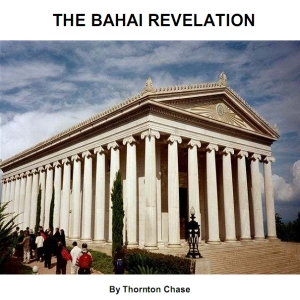
Thornton Chase is commonly recognized as the first convert to the Bahá’í Faith of Occidental background. During his life he organized many Bahá’í activities in Chicago and Los Angeles and was considered a prominent Bahá’í. In 1894, Chase met Ibrahim Kheiralla, a Bahá’í from Beirut who had recently come to the United States. Chase and a small group of Chicagoans began to study the Bahá’í Faith with him. By 1895 he had completed the class and become a Bahá’í. In 1907 Chase was able to go on pilgrimage. Though Chase was able to be with ‘Abdu’l-Bahá in Akka for only three days, the experience transformed him. ‘Abdu’l-Bahá, highly impressed by Chase’s qualities, conferred on him the title Thábit, "steadfast". On returning home, Chase wrote an account of his pilgrimage, which was published under the title In Galilee in 1908. The short work gives a detailed and poignant description of ‘Abdu’l-Bahá's home and family in Akka, as well as a moving description of ‘Abdu’l-Bahá himself. Chase then turned his thoughts to an introductory book on the Bahá’í Faith. Published as The Bahai Revelation in 1909, this work was one of the most comprehensive and accurate introductions to the Bahá’í Faith written by an early American Bahá’í. It continued to be reprinted until the 1920s. The work emphasized the Bahá’í Faith and its teachings as a vehicle for personal spiritual transformation. Shoghi Effendi, the Guardian of the Bahá’í Faith, later honoured him as one of the Disciples of ‘Abdu’l-Bahá (also termed “Heralds of the Covenant”). (Adapted from Wikipedia)
31 episodes
Thornton Chase is commonly recognized as the first convert to the Bahá'í Faith of Occidental background. During his life he organized many Bahá'í activities in Chicago and Los Angeles and was considered a prominent Bahá'í. In 1907 Chase was able to go on pilgrimage. Though Chase was able to be with `Abdu'l Bahá in Akka for only three days, the experience transformed him. `Abdu'l Bahá, highly impressed by Chase's qualities, conferred on him the title Thábit, "steadfast." On returning home Chase wrote an account of his pilgrimage, which was published under the title In Galilee] in 1908. The short work gives a detailed and poignant description of `Abdu'l-Bahá's home and family in Akka, as well as a moving description of `Abdu'l-Bahá Himself. The work remains one of the most important examples of the genre commonly known as pilgrim's notes.
(Summary by Wikipedia)
9 episodes

Kalimát-i-Maknúnih or The Hidden Words is a book written in Baghdad around 1857 by Bahá'u'lláh, the founder of the Bahá'í Faith. This work is written partly in Arabic and partly in Persian. The Hidden Words is written in the form of a collection of short utterances, 71 in Arabic and 82 in Persian, in which Bahá'u'lláh claims to have taken the basic essence of certain spiritual truths and written them in brief form. Bahá'ís are advised by `Abdu'l-Bahá, the son of Bahá'u'lláh to read them every day and every night and to implement its latent wisdom into their daily lives. He also said that The Hidden Words is a treasury of divine mysteries" and that when one ponders its contents, "the doors of the mysteries will open."The text of the Hidden Words is divided up into two sections: one from Arabic, and another from Persian. Each consist of several short, numbered passages. The Arabic has 71 passages, and the Persian has 82. This audiobook only contains the Arabic section. Each passage begins with an invocation, many of which repeat. Some common invocations include "O Son of Spirit", "O Son of Man", and "O Son of Being". Bahá'í prayers are written in the first person of humanity, so that the reader can feel like they are having a conversation with God. The Hidden Words are written in the first person of God, so that the reader feels like God is speaking to them. In 1903, Mr. Hussein Rouhy translated the Arabic portion of the Hidden Words, which appeared in Myron Phelps' "Life and Teachings of Abbas Effendi". Phelps' writes that "Mr. Rouhy furnished me with literal translations from the original Arabic and Persian. In order to avoid obscurities and forms of expression and figures of speech unfamiliar to Western readers, these have been somewhat modified in form; but in all cases without departure, I think, from the meaning of the originals." It should be noted that this translation was superceded by the more masterful, authorized translation of Shoghi Effendi, the Guardian of the Bahá'í Faith, which has not yet entered the public domain. (Adapted from Wikipedia)
4 episodes
Das Dhammapada ist eine Anthologie von Aussprüchen des Buddha. Dabei sind die Verse so ausgewählt, dass sie den Kern der Lehre des Buddha wiedergeben. Es ist einer der bekanntesten Texte dieser Lehre und findet seine weiteste Verbreitung im südlichen Buddhismus. Dort begleitet es die Schüler des Buddha vom Anfang bis zum Ende ihres Pfades. Darüber hinaus ist es ein Meisterwerk sowohl der frühen buddhistischen Literatur als auch der indischen Tradition des Karvya (Belle Lettre). (Introduction by Wikipedia)
9 episodes
"We also have a religion which was given to our forefathers, and has been handed down to us their children. It teaches us to be thankful, to be united, and to love one another! We never quarrel about religion."
7 episodes

“Many believe that we, in this century,” writes Ethel Rosenberg, “ are witnessing the dawn of a new spiritual epoch or era. A renewal of the Spirit is making itself felt in the Churches and in the religious and social life of all lands. This is in harmony with the teachings of the Bahais, and of their Great Leaders, now represented by Abdul Baha the ‘Servant of God,’ known to the outside world as Abbas Effendi. Once again, the Light is shining forth from that land which may indeed be called the Holy Land: for have not its valleys and hills been trodden from the beginning by the feet of those great Messengers inspired of God—Abraham, Elijah, and last and greatest, Jesus of Nazareth? Is it strange that once more in this century of ours, in this ‘cradle of the race,’ those that were sitting “in darkness have seen a Great Light,” the light of the Sun of Righteousness that rises with healing in his wings?”Ethel Jenner Rosenberg (1858-1930) was a prominent British Bahá’í, having been introduced to the Bahá’í Faith in 1899 by Mary Thornburgh-Cropper. She published two booklets on the Bahá’í Faith, of which “A Brief Account of the Bahai Movement” was one. She also presented a paper on the Bahá’í Faith at the International Congress for the History of Religions in 1908. She assisted Laura Clifford Barney in compiling Some Answered Questions and Lady Blomfield in compiling Paris Talks. She began to learn Persian and assisted Shoghi Effendi, the Guardian of the Bahá’í Faith, in translating the Hidden Words of Bahá’u’lláh. She was described by Shoghi Effendi as ‘England’s pioneer worker’. (Introduction by Nicholas James Bridgewater)
5 episodes
The second book of the Pentateuch - Exodus. Presented according to weekly parshah.Praised are You, Adonai, Our G-d, ruler of the Universe, who has made us holy with commandments and commanded us to engage in the study of Torah. (Introduction by Linette Geisel & traditional prayer. Parshat descriptions provided by Wikipedia)
11 episodes
The Ramayan is an ancient Sanskrit epic. It is attributed to the Hindu sage Valmiki and forms an important part of the Hindu canon (smṛti). The Ramayana is one of the two great epics of India, the other being Mahabharata. It is the story of Rama, who emabrks on an epic journey followed by the fight with Ravana, the demon king who abducted Rama's wife, Sita. The epic depicts the duties of relationships, portraying ideal characters like the ideal servant, the ideal brother, the ideal wife and the ideal king. (Introduction by Om123, with much wikipedia help.)
25 episodes
In 1906, Eben Francis Thompson,scholar and poet, published a limited edition of his translation of the Quatrains of Omar Khayyam. This edition contains 878 quatrains, and represents the most extensive translation of Omar's rubai in any language.In the Introduction, Nathan Haskell Dole writes: Mr Thompson has put into English verse this whole body of Persian poetry. It is a marvel of close translation, accurate and satisfactory. He has succeeded in doing exactly what he set out to do - to add nothing and to take nothing away, but to put into the typical quatrain, as determined by Fitzgerald and others, exactly what Omar and his unknown imitators said. (Summary by Algy Pug)This project was proof listened by Algy Pug and Bev J. Stevens.
10 episodes
Trine tells us that by connecting and harmonizing with the Universe we attract love, health, peace and success. Trines' writings may have been the most important to the "New Thought" movement of the late 1800's and early 1900's which was the forerunner to the "New Age" movement. (Summary by kirk202)
13 episodes
Look! it's the science of sitting, No! it's the science of meditating, No! it's Zen. If you wanted to know anything regarding Zen Buddhism and you did not have the opportunity then here is your chance to listen to the wisdom of a Zen Buddhist Abbot who toured the United States in 1905-6 and most of the sections in this book were lectures that were given to the American Audience, which is why this work is nicknamed as "Zen for Americans.""The Zen that can be explained is not the Zen" said the second patriarch to Bodhi Dharma but this book tries to explain the basic principles that can help you get started on the journey of experiencing Zen. Some of the essays in this book were used as a reference by Leo Tolstoy in one of his works. (Summary by sidhu177)
23 episodes
The Ramayan is an ancient Sanskrit epic. It is attributed to the Hindu sage Valmiki and forms an important part of the Hindu canon (smṛti). The Ramayana is one of the two great epics of India, the other being Mahabharata. It is the story of Rama, who embarks on an epic journey followed by the fight with Ravana, the demon king who abducted Rama's wife, Sita. The epic depicts the duties of relationships, portraying ideal characters like the ideal servant, the ideal brother, the ideal wife and the ideal king. Book 6 of Rmayan, also known as Lanka Kanda is the climax of the book where the big fight between Rama and Ravan is described. In the end the good destroys the evil and peace is restored. (Summary by om123)
26 episodes
The simple aim of this little book is to give so succinct and yet comprehensive a digest of Buddhistic history, ethics and philosophy as to enable beginners to understand and appreciate the noble ideal taught by the Buddha, and thus make it easier for them to follow out the Dharma in its details. In this book, information is presented in a catechism format: question and answer. The matter has been grouped within five categories, viz.: (1) The Life of the Buddha; (2) the Doctrine; (3) the Sangha, or monastic order; (4) a brief history of Buddhism, its Councils and propaganda; (5) some reconciliation of Buddhism with science. and there is a most enlightening appendix which give 14 fundamental Buddhist beliefs that were universally accepted at the time. - Summary by Phil Chenevert
6 episodes

Three diverse essays on souls in animals, a comparison of Buddhism and Christianity, and individualism in religion. Born in Hanover, New Hampshire, James Freeman Clarke attended the Boston Latin School, graduated from Harvard College in 1829, and Harvard Divinity School in 1833. Ordained into the Unitarian church he… soon threw himself into the national movement for the abolition of slavery. In 1839 he returned to Boston where he and his friends established (1841) the Church of the Disciples which brought together a body of people to apply the Christian religion to social problems of the day…. Many of Clarke's earlier published writings were addressed to the immediate need of establishing a larger theory of religion than that espoused by people who were still under the influence of Calvinism…. Clarke was an advocate of human rights…. Tempered and moderate in his views of life, he was a reformer and a conciliator.... James Freeman Clarke was one of the very first Americans to explore and write about Eastern religions. These three essays are taken from his book Nineteenth Century Questions (1897). ( Wikipedia and david wales)
3 episodes
The problem of life consists in learning how to live. It is like the problem of addition or subtraction to the schoolboy. When mastered, all difficulty disappears, and the problem has vanished. All the problems of life, whether they be social, political, or religious, subsist in ignorance and wrong-living. As they are solved in the heart of each individual, they will be solved in the mass of men. Humanity at present is in the painful stage of “learning.” It is confronted with the difficulties of its own ignorance. As men learn to live rightly, learn to direct their forces and use their functions and faculties by the light of wisdom, the sum of life will be correctly done, and its mastery will put an end to all the “problems of evil.” To the wise, all such problems have ceased. Summary by James Allen.
8 episodes
The third book of the Pentateuch - Leviticus. Presented according to weekly parshah.
Praised are You, Adonai, Our G-d, ruler of the Universe, who has made us holy with commandments and commanded us to engage in the study of Torah. (Traditional prayer).
- Summary by Linette Geisel. Parshat descriptions provided by Wikipedia
10 episodes
LibriVox volunteers bring you 12 recordings of Blessings for Chanukah by Jessie E. Sampter.
This was the Weekly Poetry project for December 9, 2018. ------
Jessie Sampter was a Jewish educator, poet, and Zionist pioneer. She was born in New York City and immigrated to Palestine in 1919. In her twenties, she joined the Unitarian Church and began writing poetry. Her poems and short stories emphasized her primary concerns: pacifism, Zionism, and social justice. - Summary by Wikipedia
12 episodes
The Koran is divided into 114 Surahs. It re-tells the stories of most of the previous prophets. It also covers Marriages, Inheritance, Banning, Pilgrimage, etc.
Special thanks to catharmaiden (Sandra Schmit) for Proof-Listening some of the Surahs. And thanks to Kitty (Sonia) for being the MC and DPL. We're grateful for your help and support. - Summary by SaraHale
70 episodes
Started in 1907, An Historical Sketch was a work in 3 volumes, of which this is the first. The author was a British diplomat posted to Asia and his great work was interrupted by World War I, finally being published in 1921. It has been described as the definitive work on the subject and the style is easy to read and follow.
48 episodes
A series of short readings (lessons, if you will) for Jewish youth and others. This book ought not to be viewed as a kind of catechism, but the author and editor offer helpful perspectives on Jewish belief. - Summary by KevinS
17 episodes
Hester Dowden, who wrote under the name Hester Travers Smith, was an Irish spiritualist medium. She claimed to have communicated with the spirits of various celebrities. In Oscar Wilde from Purgatory, she reproduces the text of her "conversations" with the Irish poet and playwright, conducted via a Ouija board and automatic writing. Wilde proves just as talkative after death as he was in life. His spirit revels in the complements paid to his work by Travers Smith and her colleagues, describes how it feels to exist without a body, and pronounces James Joyce's recently published novel Ulysses a "great bulk of filth". Listeners who are primarily interested in the conversations, rather than Travers Smith's lengthy discussion of them, are directed to Chapter 1 and the Appendices. - Summary by Rob Marland
10 episodes
